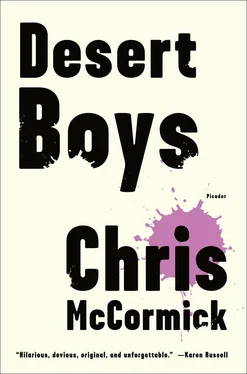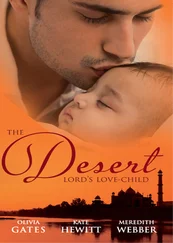“Those should last you a while,” Karinger said.
Watts said he didn’t mean the porn; he meant “this” —he moved his hand in a circle between the three of them to elaborate.
“I’ll be back for a little after boot camp,” Karinger said. “We’ll get together again before I ship out.”
Kush said, “I’ll probably be up north for orientation, I think.”
Karinger nodded. “Well, I guess this is it.”
“For a while, anyway,” said Watts. He finished what was left in his mini-bottle and tossed it into the bed of the truck, bringing on the heavy sound of thick glass hitting metal.
“Who knows?” Kush said. “Forever, maybe.”
Karinger and Watts laughed. Watts said, “Kush, why do you always have to be such a dramatic motherfucker?”
Near the backpack, Kush took a knee and grabbed the last mini-bottle, which he opened and finished in one swallow. When he stood, he said, “Karinger, you always said I needed to be more decisive, right?”
“‘Indecision is death,’” Karinger said, quoting somebody.
“This isn’t me being dramatic.”
“Tell me, man. Whatever it is you want to tell me, tell me.”
“This war is criminal,” Kush said, feeling as though the cold rush of truth came through him.
Karinger turned his face and laughed it off. “Is it, now.”
“I mean,” said Kush, “you’re not dumb enough or sadistic enough to go kill people for money, are you?”
From Watts: “Kush, you drunk asshole. The war is way more complicated than—”
“If you say one more word,” Kush said, turning to Watts, “I’ll tell him something else I should’ve told him a long time ago.”
“You’ve got a lot of growing up to do,” said Karinger. “A younger me would’ve knocked you out already.”
“You’re still a younger you!” Kush said, shouting now. “That’s the point! If you die in that war, it’s a younger you that’ll die, and for what? Absolutely nothing!”
The power Kush felt just a minute ago had already begun to fade. Now he felt something less heroic, but he’d gone too far to pull back. Seeing no other option to try to regain that power, he wound up and threw the empty miniature bottle at Karinger as hard as he could. To his surprise, the bottle hit its target, glancing off Karinger’s enormous shoulder and breaking apart against the driveway.
Karinger looked at the bits of glass, which refracted the motion sensor’s light here and there against the side of Watts’s truck and across his own shadow. He stepped forward and planted his forehead against Kush’s. This was the closest they’d been since their game of chicken in the desert four years earlier. Kush braced for a punch until he heard Karinger laugh.
“Let’s not pretend this is political,” Karinger said. “I know why you really want me to stay.”
He raised his finger to his mouth. “Go ahead, Kush. Kiss me.” Karinger closed his eyes. He cartoon-puckered his lips.
And for the first time in a long time, Kush acted without thinking. He kissed Karinger with his eyes closed. With his mouth he held on to Karinger’s fat lower lip as long as he could, and felt the cracks at the center from the dry, searing summer winds. When Karinger seemed to let him have the kiss, every fantasy Kush had tried so diligently to ignore over the years occurred to him at once. The result was a magnificent barrage of embarrassments, sentimental on the one hand, pornographic on the other. Kush never figured out which was more pathetic: the times he’d daydreamed of skipping town with Karinger to San Francisco or New York or Paris, or the nights he’d spent alone in his bedroom after a day of paintball, licking from between his fingers his own semen, and imagining the taste — like a desert plant, leafy and hot — was his friend’s. Either way, it was in his mouth now, the withered taste of shame itself. It had been rooted in his memory, but now shot from his brain to the wet nib of his tongue, which pressed between the small valleys in Karinger’s bottom row of teeth. And before Karinger stepped back and threw his fist so perfectly into Kush’s chest that the impact felt to Kush less like a punch than a tree breaking a horrendous fall, Karinger kissed him back. Hadn’t he? He seemed to have kissed Kush back, a brief but beautiful hold on Kush’s mouth, so forceful and lovely that Kush, after the punch, felt not only the immense pain in his chest but also, in his top lip, a kind of swelling.
Now Kush sat upright in the driveway, one hand pressed against the thudding plate in his chest, the other behind him, for balance, against an oil stain.
Above, Karinger picked up his backpack and, fitting his arms into the straps, said, “Everyone, including you, will be happier once you’re in Berkeley. It’s where you belong.”
Kush, still struggling to take in air, said, more deliberately and honestly than he’d said anything in his life, “Go die for nothing, asshole. I hope you do.”
Then Karinger spat on the ground, walked the path to the front door, and disappeared.
“I should have told him about Roxanne,” Watts said on the drive home. His hands on the wheel were shaking. “We could’ve avoided all that back there. I should’ve been the guy getting punched.” Now he was crying, swiping his nose and eyes with the back of his hand. At a red light, he twisted his fists over his eyes, and for the first and only time, Kush felt he wasn’t the weakest of the three.
* * *
The day before the baptism, Lloyd and I were at a sidewalk café eating crepes with strawberries and Nutella. We’d seen each other every day for six weeks. No one would argue six weeks is a long period of time for a relationship. But look: We were sitting on one side of a small circular table on a sidewalk in Oakland, California, under a cloudless, bright sky. A mother pushing two babies in a double-seat stroller passed us and — when Lloyd licked his thumb and wiped chocolate from my face — smiled a benevolent smile. Six weeks was not separate from ten years, I felt, or any bit of my life. Six weeks, in some ways, was everything.
“So,” Lloyd said, “I was thinking. Maybe I can come along with you tomorrow. See your hometown, meet the gang. Maybe even meet that mysterious Armenian mother of yours.”
Just then, the blaring sound of sirens wailed by, and I imagined Watts driving his ambulance around the Antelope Valley. He was a man now — a man who saved lives, I was proud to say. For whatever reason, though, I couldn’t think of Karinger as the husband and father he turned out to be. I didn’t think of him as a man. I felt awful admitting that. I tried to picture him fighting that war out there in a climate not unlike what we’d been used to, and all I could see was the boy in that gas mask, shooting his gun at other boys, frightened boys crouching behind a sofa. Hostile, hostile fire, small-arms fire, Kandahar Province —I had these bits of information, but none that helped me imagine the scene of his death. So I thought instead of that silly note I wrote and carried with me for so long, slipping it into his backpack as I took that last miniature bottle of liquor in the driveway. I thought of how he must have discovered it at some point, using the same language with his wife later on, and I tried to imagine what he felt while reading my words. How close had he come to calling me? What was it he’d said, about my having to grow up? To have a person so young tell you to grow up …
“Well,” Lloyd said. “I don’t need to come along. But how excited are you to go back home? What do you think it’ll be like, seeing everyone again?”
I could imagine. I would head to the church near the old library a bit early. I’d slip into the back pew and wait for the important players to assemble at the altar — mother, godfather, baby, priest. I’d recognize the bald priest, who would joke with the baby: Come on in, the water’s fine. The churchgoers, perpetually reminded of the unspoken sadness of the day, would appreciate the humor. Our laughter would complement the crying of the baby, who’d be lifted and dipped, lifted and dipped, lifted and dipped until every last prayer was heard.
Читать дальше












